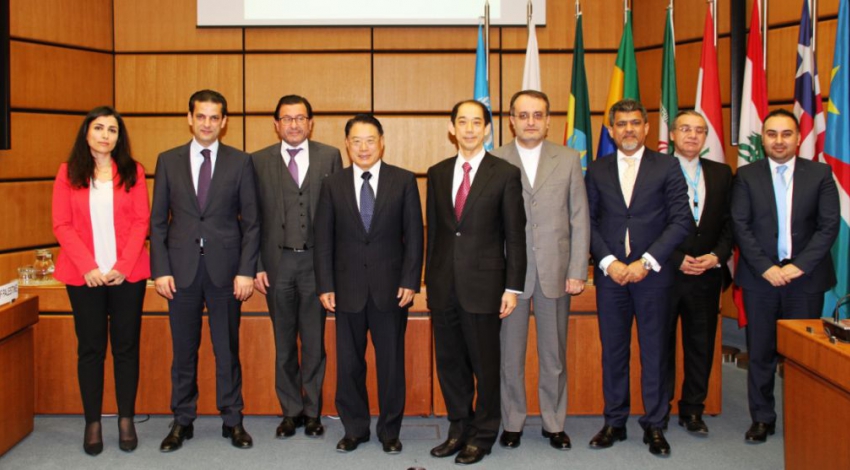Saturday 16 March 2019 - 15:47
Story Code : 342498
Japan provides over US$5.8m. to support UNIDO projects
These UNIDO projects promote inclusive and sustainable industrial development by taking a human security approach. The concept of human security is closely related to the 2030 Agenda for Sustainable Development as it focuses on people and the ambitious goal to "leave no one behind".
UNIDO�s concept of inclusive and sustainable industrial development is included in the Sustainable Development Goals (SDGs), particularly in Goal 9 to build resilient infrastructure, promote inclusive and sustainable industrialization, and foster innovation. UNIDO�s mission echoes Goal 9 but also aligns with other SDGs, including those that are human security-related.
A kick-off ceremony, hosted by UNIDO Director General LI Yong and Ambassador Mitsuru Kitano, the Permanent Representative of Japan to the International Organizations in Vienna, has taken place in the presence of representatives from recipient countries.
�We thank the Government of Japan for the trust placed in us to deliver tangible results in close cooperation with all involved partners,� said UNIDO Director General Li. �The projects we are unveiling today are going to address the inequalities faced by the most vulnerable populations, inequalities that are preventing them from reaching economic empowerment.�
Ambassador Kitano expressed appreciation for UNIDO�s role �as a platform connecting recipient countries, donor countries and the private sector". He also said these nine projects �contribute to the Sustainable Development Goals, and at the same time, embody such important concepts as human security and the humanitarian-development nexus".
The project in Ethiopia builds on the outcomes of the first phase of the project, funded last year. It continues activities to improve the water supply, public health and general environmental quality through an innovative water sanitation system, which utilizes environmentally-friendly slow sand filtration and photo-voltaic electricity-generating technologies.
In Gabon, the project will strengthen food security and food quality to improve livelihoods, especially for women. It will provide direct technical assistance to inspection and market surveillance institutions, as well as to small-scale food producers in order to comply with international standards and promote awareness of the importance of quality with consumers and the private sector.
In the Islamic Republic of Iran, the project will promote the integration of the fishery and ancillary industries in Chabahar in the southern� province of Sistan-Balochistan into regional and global markets through the capacity building of local institutions, the upgrading of enterprises in terms of quality, productivity and resource efficiency, and the enhancing of market access.
The project in Iraq will draw on the expertise of UNIDO in harnessing the productive capacities of internally-displaced persons and returnees through entrepreneurship and upgrading of technical skills. It aims to contribute to social stabilization and economic resilience in the Nineveh Governorate. In recent years, UNIDO has implemented several projects in Iraq with support from Japan.
The project in Lebanon will build on the results achieved in three previous interventions in the north of Lebanon to create economic opportunities and jobs in the construction sector, particularly among host and refugee communities. It will support the establishment of a vocational and skills training centre.
In Liberia, a project implemented in Nimba county will promote social stabilization by creating jobs and livelihoods for vulnerable people and communities, with a particular focus on youth. In targeting the wood and furniture industry, the project follows the Government of Liberia�s key priority areas for economic growth.
In South Sudan, the project will be implemented in Juba and its urban and peri-urban neighbourhoods. It will support agro-value chain development to create employment and income opportunities for internally-displaced persons and their host communities by providing skills and entrepreneurship training and by establishing the basic facilities for agro-processing.
A project will also be implemented in the State of Palestine to enhance the support for the creative garment and textile industry in the northern region of the West Bank. It aims to improve livelihoods and job opportunities, particularly for youth, and to support the development of local value chains.
In the Syrian Arab Republic, UNIDO will again partner with the UN Development Programme as lead agency, and with the United Nations Population Fund (UNFPA), the United Nations Human Settlements Programme (UN-HABITAT), the UN Food and Agriculture Organization (FAO) and the World Health Organization to maintain and improve Syria's human capital in various fields by providing multi-sectoral training opportunities to upgrade skills and knowledge for resilience building.
# Tags











